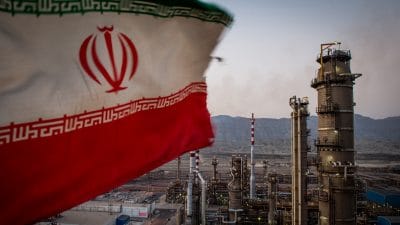Dubai: Iran said it had exceeded limits set on its enriched-uranium stockpile, a move that risks the collapse of the 2015 nuclear accord and raises concerns that a standoff with the U.S. could lead to military action.
“As I was informed, Iran has crossed the 300-kilogram cap according to plan,” the Iranian Students’ News Agency cited Foreign Minister Mohammad Javad Zarif as saying. “We have clearly expressed what we are doing and will act upon it,” he said, saying the step was in line with Iran’s rights under the agreement.
The breach is likely to heighten tensions in the Persian Gulf that have spiked since the Trump administration exited the nuclear accord a year ago and reimposed crippling sanctions on Iran, prompting a warning that Tehran will ditch elements of the deal unless it’s given an economic lifeline by July 7. Attacks in the Strait of Hormuz, a vital waterway for oil shipments from the Middle East, and the Iranian downing of an American drone have raised concerns of another war in the region.
Foreign Ministry Spokesman Abbas Mousavi said earlier on Monday that if European nations working to salvage the nuclear deal “take more concrete steps, Iran’s action in cutting back on its commitments can be rolled back,” according ISNA.
The move was “carefully calibrated” by authorities and “isn’t in itself dangerous because it can be reversed,” said Sanam Vakil, senior research fellow at Chatham House Middle East and North Africa Program. “It’s the action and reaction and what comes next — it’s a step in what can be a slippery slope.”
International Atomic Energy Agency spokesman Fredrik Dahl confirmed that Iran’s stockpile of low-grade enriched uranium exceeded 300 kilograms (661 pounds).
Iran was expected to breach the cap on Thursday, though it had appeared to back off from its warning following efforts led by European nations to preserve the accord. Seven more European countries agreed on Friday to support the U.K., Germany and France in rolling out a trade mechanism, known as Instex, that aims to protect trade with Iran from U.S. sanctions. Diplomats said the first transactions using the vehicle had been processed.
European powers opposed President Donald Trump’s decision last year to quit the multinational accord intended to curb Iran’s nuclear development in exchange for easing sanctions. But they have been so far unsuccessful developing ways to maintain economic relations that avoid the U.S. banking system and the sanctions that Trump reimposed.
At the same time, they had called for Iran to continue adhering to the accord, knowing that any violation would put European leaders in a difficult position with regard to U.S. officials.
Tehran “has been escalatory in pushing Europe to challenge the Trump administration” and European nations are “struggling to find a band aid” to keep the agreement alive, Vakil said.
The nuclear deal was designed to prevent Iran from breaking out and constructing a weapon within a year, as the U.S. and its allies feared. The Arms Control Association, a Washington nonprofit, estimates Iran would need about 1,050 kilograms (2,315 pounds) of uranium enriched to 3.67% to build one bomb. The material would then need to undergo further enrichment.
Trump says he wants to negotiate a better deal that would also restrict Iran’s missile program and support for armed proxies around the region. But Iran says it can’t negotiate by force and while its economy and — more recently — its leaders are targeted by the U.S.
Also read: At G20, saving the Iran nuclear deal is at the heart of emergency talks among world leaders






